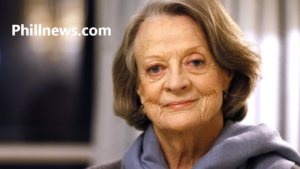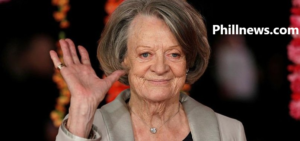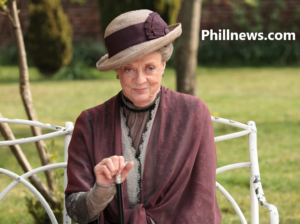Dame Maggie Smith, One of Britain’s Greatest Actresses, Dies Aged 89
Introduction
A legend has passed away, Dame Maggie Smith, a British actress with a career lasting more than sixty years, has died of a heart attack at the age of 89, states her relatives. As an actress, Smith was characterized for her flexibility as well as excellent performing proficiency; thus, the actress will always be remembered by numerous people, including the new generations of viewers of films, television shows, and theaters all over the globe. The careers of Maggie Smith’s stunning stage presence as well as her legendary performances in several timeless plays or the select memorable roles in some of the most popular films of all time. She was an actress who could make everyone laugh, cry, or just admire her doing her thing at one time or the other and maybe in one scene.
Early Life and Education
Dame Margaret Natalie Smith better known as Maggie Smith was born on December 28, 1934, in Ilford, Essex England. Margaret was the youngest of the three children of Nathaniel Smith, a public health pathologist, and Margaret Hutton Little, a Scottish secretary. Smith was born in the Second World War, and her childhood was certainly not calm, which affected her work in the future. Her family moved to Oxford when she was four to join her father who had got a job as a medical researcher at the University of Oxford.
The talent that was interesting in the drama was evident when Smith was at the Oxford High School. Already at such a young age, she could perform emotions and entertain an audience like no other. Having resolved to take acting as a full-time profession she joined Oxford Playhouse School to do drama. It is in this school that Maggie Smith first found her love for Theater; which in turn would help contribute to one of the major aspects of her career.
The Beginning of a Legendary Career
Smith joined professional acting on stage in 1952 at Oxford Playhouse where she had performed Shakespeare plays. These qualities were demonstrated in her earliest stage experience in Shakespeare’s “Twelfth Night” and “Macbeth”. In a short time, she transferred to London and many were drawn to her talent she was later taken to perform at the West End, and in 1962 she joined the Royal National Theatre.
Her career only started to blossom in the 1960s, when she started working with the National Theatre with Sir Laurence Olivier. These performances created a streak of successful shows; the most famous of them was the performance of Desedonna in “Othello.” This role Successfully earned her a BAFTA nomination when this play was filmed and released in 1965. The partnership with Olivier was an important move in her career which helped her to receive the recognition she deserved as one of the major theater actresses of her generation.
Smith was happy being a comedienne, but she soon discovered that she was equally suitable for dramatic characters, and her versatility made her work most sought after by both British and international directors. She received her first Academy Award nomination for her performance in “Othello” Later she won her first Oscar for Best Actress in 1969 for her role in “The Prime of Miss Jean Brodie.” The portrayal of an unconventional and very erotic teacher enthralled the hearts of the viewers and the critics to cement her as a force to be reckoned with in Hollywood.
Hollywood and International Acclaim
After the movie “The Prime of Miss Jean Brodie”, there were more film accolades that Smith received. For the next twenty years, she continued to feature in many films in the 1970s and 1980s even as she demonstrated her versatility. In the same year, she got her second Oscar for Best Supporting Actress for her part as Diana Barrie in California suite. Most importantly, her skill of making depth and even humorous undertones to her character made her a favorite to worldwide viewers.
Screen legend Maggie Smith had several great experiences with director James Ivory and producer Ismail Merchant. Her performances in “A Room with a View” (1985 ) and “The Lonely Passion of Judith Hearne” (1987 ) and for the latter she was honored with a BAFTA award for Best Actress. Despite this, Smith continued to act in British and American films, though she quickly became typecast mainly as a comedienne who could easily turn dramatic.
Stage Success and Continued Presence in Theater
Owing to her movie roles, Maggie Smith was probably as famous as she ever needed to be, however, she never gave up on her passion for theatre. In the later years, Smith goes backstage again and again to reprise her genius in some of the finest dramatic productions of the American Twentieth Century. With the Royal National Theatre and later joining the Royal Shakespeare Company as the key performing theatre company she assertively claimed her position as one of the most talented stage actresses of her generation.
Some of her stage credits are Hedda Gabler, The Way & the World, and Three Sisters. She has been especially acclaimed by critics for her performance as the protagonist of Edward Albee’s “A Delicate Balance” which earned her the Evening Standard Theatre Award for Best Female Performance. Smith had this remarkable gift to come alive her character hence making every show an acting prowess. She had a passion for the stage and indeed remained active in theater production even in her old age.
Harry Potter and the Global Stage
Anyone under 30, and even many over 30, first and foremost associate Maggie Smith with Professor Minerva McGonagall from the “Harry Potter” movies. Starting with ‘Harry Potter and the Philosopher’s Stone’ released in the year 2001, Smith portrayed the role of the strict yet compassionate professor of Hogwarts in all the potential movies finishing with ‘Harry Potter and the Deathly Hallows – Part 2’ released in 2011. Her portrayal of McGonagall added a new legion of fans to her name and gave depth to the character that made her seem human.
McGonagall being played by Smith was particularly close to the heart as Smith continued to work on the series while battling breast cancer she was diagnosed with in 2007. It has marked her qualities of perseverance and gumption during this period, which proved her seriousness in her work. That role helped Smith gain millions of fans from all across the world; thus, she is among the most recognized actors in the contemporary film industry.
Downton Abbey and Television Stardom
Apart from theater and movies, Maggie Smith joined the limelight in television acting most famously as Violet Crawley, the Dowager Countess of Grantham in the famous show “Downton Abbey”. First aired in 2010, “Downton Abbey” quickly grew into an internationally acclaimed series, and Smith’s characterization of the acid-tongued, caustically funny Dowager Countess was one of the show’s highlights. Her insults and perfect timing made her famous and she received three Primetime Emmy Awards.
It brought Maggie Smith into mainstream television once more, and her character is easily the most beloved on the show. Many of the show’s fans would remember how entertaining and warm at the same time Smith was as the Dowager Countess. Maggie Smith is as sharp as she was in her youth and she was able to give commendable performances throughout her career.
A Legacy of Honors and Awards
During her brilliant career, Maggie Smith won many awards and received numerous honors for her back-breaking work in the arts. She received two Academy Awards and five BAFTA Awards, four Primetime Emmy Awards, and one Tony Award, which allowed her to be among the few acting triple Crown winners. She also won the Screen Actors Guild Award and other several Golden Globe Awards.
In 1970, Smith was awarded a CBE and ten years later DBE for her services to drama. In 2014, she was honored with the Companion of Honour (CH) which is among the prestige titles in the United Kingdom for her contribution to drama. These honors are a reminder of the entertainment industry that Maggie Smith left behind and the esteem she enjoyed up to her final breath.
Personal Life and Challenges
The main issues about Maggie Smith’s personal life include success failure and sadness. She was married twice: to actor Robert Stephens in 1967, they had two sons, Chris Larkin and Toby Stephens. They got divorced in 1975 after this period of marriage. She was later married to playwright Beverley Cross in 1975 till he died in 1998. Smith mostly benefited from the Cross’s support, especially when experiencing some of the rough prospects in her career.
Smith in 2007 was diagnosed with breast cancer and as the general makeup of those we profile shows, she fought the ailment just like the fighter she is. She was able to work during her chemotherapy and never once let herself be confined by the limitations that her disease brought her and what she wanted to do. Such tenacity to continue with the profession of acting whenever such a test was posed to her was an inspiration to many.
Smith was purposefully very discreet and was not often seen discussing her personal life and hardly granting interviews. She was one of the most famous women in the country but she never exploited her position disrespecting her work.
The Final Years
After reaching the climax of her career, Maggie Smith still went on to act, although not as frequently. She is also noted for her appearances in “The Best Exotic Marigold Hotel and the second part of the film, and “The Lady in the Van,” a film in which she received her sixth BAFTA nomination. Another one of her best was the extreme character of Miss Shepherd from the play, in which she lived in a van on the driveway of the playwright, Alan Bennett, for nearly 15 years it has comedy and pathos in equal measure, proving how profound a deeply eccentric character could be.
The Dowager Countess was also featured in the Downton Abbey films, which fans would have been glad to see Smith return to. Though she was in her fifties, she was as funny and intelligent as before; she performed like she was still a young woman who was loved and admired by all those who knew her as a comedian.
 Phill News Entertainment – Phill News
Phill News Entertainment – Phill News






